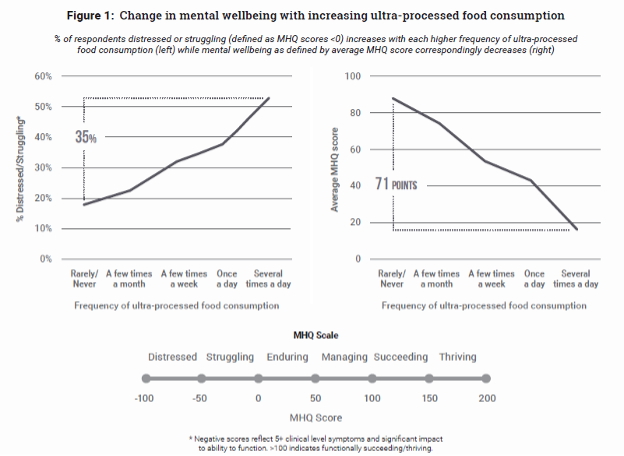
As we navigate the growing challenges of the global mental health crisis, one potential culprit has increasingly emerged from the shadows: ultra-processed foods (UPFs). Often maligned for their role in obesity and physical health issues, these foods may also be significantly affecting our minds, according to a recent rapid report by Dr. Tara Thiagarajan of the Global Mind Project.
The findings from this global study, encompassing nearly 300,000 respondents across 70 countries, are startling. They paint a clear picture: the more frequently we consume ultra-processed foods, the more likely we are to struggle with our mental health.
Ultra-Processed Foods and Mental Health: What the Study Found
Ultra-processed foods—like sugary cereals, sodas, pre-packaged snacks, and fast foods—make up a substantial portion of modern diets in countries such as the United States and the United Kingdom. In these regions, nearly 60% of all calories consumed are derived from UPFs. While we often associate these foods with physical health problems like obesity and diabetes, this new study reveals that they may also be silently contributing to the global mental health burden.
Dr. Thiagarajan’s report highlights that those who consume ultra-processed foods several times a day are three times more likely to struggle with serious mental health issues compared to those who rarely or never eat them. In other words, over half of the individuals eating UPFs daily are in a state of mental distress, compared to just 18% of those who consume these foods rarely. This represents a profound 3-fold increase in mental health challenges (Figure 1).
The impact of UPFs appears consistent across all age groups, but the stakes are highest among young adults aged 18-24—who are the largest consumers of these foods. This correlation suggests that UPFs might be contributing significantly to the escalating rates of depression and anxiety, especially among the younger population.

Source: Sapien Labs: Ultra-processed food consumption and mental wellbeing outcomes Rapid Report
A Broader Impact Than Just Depression
While there has been increasing evidence linking UPF consumption to depression, the report from the Global Mind Project takes it a step further. It reveals that frequent UPF intake negatively affects multiple dimensions of mental health, ranging from mood and emotional control to cognitive function and resilience. The data suggests that UPFs may cause widespread dysregulation, not only impairing our ability to regulate emotions but also disrupting our cognitive processes, adaptability, and social interactions.
Among the most significantly impacted symptoms were those related to depression—such as feelings of sadness and hopelessness—alongside other issues like poor appetite regulation, emotional instability, and difficulty in focusing. Altogether, the breadth of symptoms suggests that ultra-processed foods could be contributing to a pervasive disruption of physiological regulation in the brain, potentially leading to difficulties in thought and emotional control.
Interestingly, the study also highlights that exercise and income, while important, do not mitigate the negative effects of UPF consumption. Those who exercised daily or had higher incomes still showed a decline in mental well-being with increased UPF consumption, underscoring the potential direct role these foods play in compromising mental health.
A Call for Change: Moving Away from Ultra-Processed Foods
The findings from this study are both a warning and a call to action. If ultra-processed foods are, in fact, a significant driver of mental health challenges, then addressing our dietary habits may be a powerful lever for improving global mental health outcomes. Dr. Thiagarajan suggests that reducing the consumption of these foods could relieve up to a third of the mental health burden—particularly in young adults.
Given the consistency of these findings across diverse populations and their independence from other factors like exercise or socioeconomic status, it’s increasingly likely that a causal relationship exists. While more research is needed to fully understand the mechanisms—whether related to nutritional deficiencies, harmful additives, or metabolic disruptions—the message is clear: our food environment matters for mental health.
For individuals, taking a closer look at what we eat could offer tangible benefits. Shifting away from pre-packaged, heavily processed meals to more whole, fresh foods could help support not only our physical health but also our mental well-being. For clinicians and mental health professionals, this information serves as a reminder that dietary habits should be considered an integral part of preventative and therapeutic approaches to mental health.
A Path to Improved Mental Wellbeing
The rise of ultra-processed foods coincides with a rise in both physical and mental health challenges. While it’s easy to dismiss the connection as purely coincidental, the data presented by the Global Mind Project tells us otherwise. UPFs aren’t just empty calories; they may be actively undermining our ability to thrive mentally.
In an era where mental health concerns are becoming increasingly prevalent, particularly among our youth, it’s time to pay attention to what’s on our plates. The science suggests that making better dietary choices could be a key strategy in mitigating the growing mental health crisis—one meal at a time.
By taking a stand against ultra-processed foods, both as individuals and as a society, we have the opportunity to tackle one of the root causes of poor mental health, leading us towards a future where our bodies—and our minds—are nourished and resilient.


